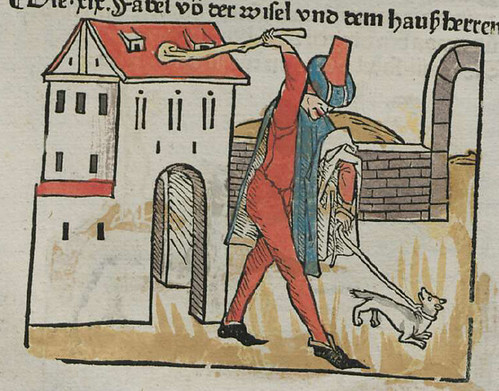HODIE (Roman Calendar): pridie Kalendas Maias, the day before the Kalends of May.
MYTHS and LEGENDS: The art image for today's legend shows Diana and Endymion; you can also see the legends for the current week listed together here.

TODAY'S MOTTOES and PROVERBS:
TINY MOTTOES: Today's tiny motto is: Semper liber (English: Always free).
3-WORD PROVERBS: Today's 3-word verb-less proverb is Tempus edax rerum (English: Time is the eater of things)
AUDIO PROVERBS: Today's audio Latin proverb is Dum stertit cattus, numquam sibi currit in os mus (English: When the cat is snoring, a mouse never runs into its mouth). To read a brief essay about this proverb and to listen to the audio, visit the Latin Via Proverbs blog.
PUBLILIUS SYRUS: Today's proverb from Publilius Syrus is: Aliena nobis, nostra plus aliis placent (English: We like other people's things more, and others like ours more).
ERASMUS' ANIMALS: Today's animal proverb from Erasmus is Bos lassus fortius figit pedem (English: The ox, when tired, fixes his hoof more firmly; from Adagia 1.1.47).
BREVISSIMA: The distich poster for today is Sic Vult Ire. Click here for a full-sized view.

And here are today's proverbial LOLcats:


TODAY'S FABLES:
FABULAE FACILES: The fable from the Fabulae Faciles widget is Leo et Tauri Duo, a story of divide-and-conquer (this fable has a vocabulary list).
MILLE FABULAE: The fable from the Mille Fabulae et Una widget is Mustela et Homo, a fable which derives from the fact that the ancient Romans kept weasels as mousers, much as we keep cats today.

GreekLOLz - and Latin and English, too. Below is one of my GreekLOLz; for the individual Greek, Latin and English versions of the graphic, see the blog post: Ἄρκτου παρούσης ἴχνη ζητεῖς. Ursa praesente vestigia quaeris. Here's the bear, and you're looking for tracks.
